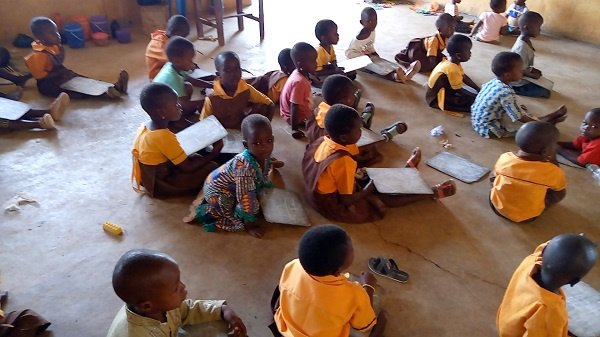Asikasu and neighboring farming communities in New Juaben North, Eastern Region are grappling with a critical educational gap — the absence of dedicated Kindergarten (KG) classrooms.
This shortage is impeding children’s access to essential early childhood education, hindering their holistic development and readiness for primary school.
Despite commendable strides in Ghana’s education sector, many farming communities continue to face barriers in providing fundamental education infrastructure.
Asikasu Presby Basic School exemplifies this struggle, with a makeshift KG carved out of staff and storerooms acting as a limiting factor.
Headteacher Clementina Ahenkwa Mensah sheds light on the predicament, explaining that the absence of a permanent classroom restricts admissions for eager young learners from surrounding farming communities.
“This school has been in existence for 30 years now. For now, we are in dire need of a KG Block which will help the KG pupils to do their normal classroom work. Currently, we are using the teachers staff room and the storeroom for them because the one we were using previously has been demolished. The kids can’t study now because it is almost collapsing so we are pleading for help. Because of this, we are unable to admit more KG pupils,” the headmistress said.
Expressing worry, parents in Asikasu and nearby farming communities such as Believe, Wurapong, Korkoso, Asikasu central, and Wurobonso, fear that their children might be left behind in this educational disparity.
They stress that the remedy lies in critical infrastructure investments, advocating for the construction of a dedicated KG block at Asikasu Presby Basic School.
“Here is a farming area so because of the lack of KG classrooms the children cannot be enrolled then many parents will be forced to take the children to farms and that is what is happening so we need the KG block,” a parent said.
Joseph Sagmor, chairman of the Parents Association told Starr News “We the residents here attempted to build a KG block but we didn’t have money so we aborted the plan. Where they were learning was bad. Sometimes their children get drenched by the rain. So it came at a time whenever the clouds gathered then they close the KG pupils but some of the children are coming from far communities so it becomes dangerous for the kids.”
This move is not merely about construction; it signifies a pathway to bridging educational gaps for children in the rural catchment area—an unwavering commitment to ensuring that no child is left behind.
Globally, the Education 2030 agenda and Ghana’s National Education Strategic Plan strive for inclusive early childhood education.
Aligned with SDG target 4.2.4, the goal is clear: by 2030, every child should have access to quality early childhood development and pre-primary education.
As Ghana progresses with initiatives like the Free and Compulsory Universal Basic Education (fCUBE), the challenges faced by communities like Asikasu and surrounding farming communities underscore the importance of targeted investments in education infrastructure to realize the vision of inclusive and quality early childhood education.
Residents believe the intervention of nonprofit organizations and corporate entities could help provide suitable KG classrooms for school-age children in the rural area.
Source: starrfm.com.gh


